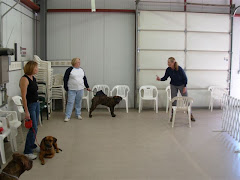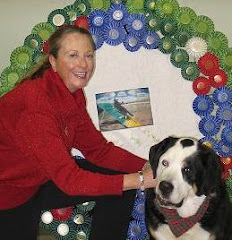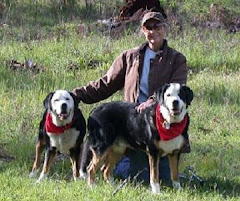


 Here's what happened....my husband and I were both gone all day yesterday. I went shopping in Missoula and he went to help a friend with a carpentry project. We left Lizzie and Kosmo in the laundry room with access thru a doggy door to the enclosed breezeway (just to give them extra romping room).
Here's what happened....my husband and I were both gone all day yesterday. I went shopping in Missoula and he went to help a friend with a carpentry project. We left Lizzie and Kosmo in the laundry room with access thru a doggy door to the enclosed breezeway (just to give them extra romping room).When we got home, we found THE BOOT, half of an expensive pair of Schnee hunting boots he got at a Rocky Mountain Elk Foundation banquet a few years ago. Lizzie had eaten half of the leather upper.
So waddaya do? To my husband's credit, he did not lose his temper, but he did look like he was about to cry. Naturally he wanted nothing to do with Lizzie for the rest of the night. These boots meant a lot to him. About all he said was, "You try to have nice things and take good care of them, and it just doesn't work."
To me, it was a nice boot, but boots can be fixed and it was our fault anyway for providing the circumstances. I should have known not to trust her all day with boots. And it's not like she attacked and killed someone's child. She got lonely and stressed, and she ate a boot.
So the issue was clearly different for me than for my husband. And we both had to deal with our "issues." I tried to imagine how I'd feel if she'd chewed up my favorite saddle, and actually, I came up with the same feelings of ambivalence that I have about the boot. That's probably due to hearing 15 years' worth of similar stories from other people, and from providing "counseling" to them in those situations. Maybe now's the time for a re-run of some of those sessions:
Owner: "I don't know what's wrong with this dog."
Me: "Nothing. She's a dog. When you have dogs in your lives, you have to prepare for stuff like this."
Owner: "She obviously doesn't know the difference between toys and non-chew items."
Me: "Depends. Generally an adult dog knows the difference. But dogs don't chew on toys when they have separation anxiety. They chew on objects readily available, or objects that smell of their owners."
Owner: "None of our other dogs were ever this destructive."
Me: "We tend to forget a lot of the bad stuff, since most of it happens when the dogs are very young anyway. Or maybe you weren't around to see it happen, but your wife was. I almost shot a dog once because I thought she was so incorrigible. But I didn't. I got over it and learned valuable lessons from her over her lifetime."
Owner: "That ___ she destroyed is irreplaceable."
Me: "So what? It's just a thing. She's irreplaceable too, and she's a beating-heart member of your family. Which is really more valuable to you?"
Owner: "She can never ever be left alone."
Me: "Maybe not all day in an area where she can destroy things. So you find other ways to manage those situations. Crate her, take her with you, send her to Doggy Day Care, or just leave her in a safer environment."
Owner: "Why is she such a bad dog?"
Me: "She's not. She's an exceptionally good dog--smart, funny, entertaining, loyal, loving, and eager to please. She chewed up your ____ because she missed you so much. How can you find fault in that?"
Next time YOUR dog damages or destroys something, whether sprinkler heads, hoses, hot tub covers, hunting boots or fancy dog beds, please remember these points:
1. Accept responsibility. It's your fault, not the dog's. You left him in a vulnerable situation. Don't yell at the dog. Honestly, he won't know why you're angry with him.
2. Face reality. Dogs frequently express their emotions in destructive ways. Something you value will be destroyed if you have a dog. If you are so materialistic that you can't come to terms with this, don't have a dog.
3. Take precautions to avoid repeat offenses. Don't leave the dog unsupervised for so long. Crate him in your absence. If must leave him "out loose" in the house, at least remove items that he may find tempting, and restrict his access to certain rooms. If it's truly separation anxiety, take additional steps like A BIG EXERCISE WORKOUT before you leave him, or desensitization training. Consult a professional trainer FIRST, and BEFORE you consult a vet for anti-anxiety medication.


















2 comments:
I've certainly been there! Bergere went through a phase where she only ate natural items, cotton socks & jeans, leather wallets, wicker baskets. Sorry about the boots!!
Whenever I complain about something that the dog did, my husband has a great comeback....
he looks at the dog and says...
"you DOG"!....
that kind of stops me in my tracks, as it reminds me, yes, this is a dog....not a person.
I must act accordingly.
Thanks for the reminders, Jan.
barb
Post a Comment